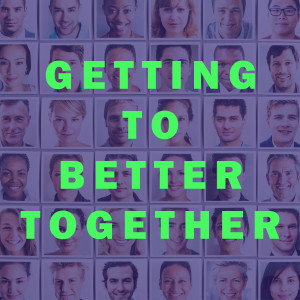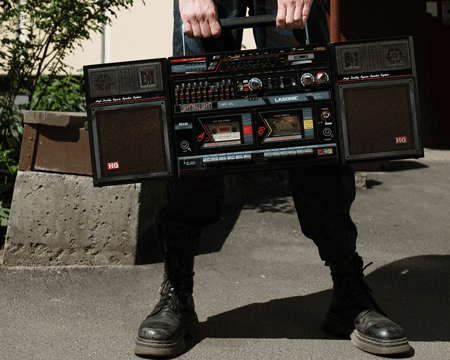Getting To Better Together
For the vast majority of us, the future has to be better than it is right now, and the only way that will happen is for as many of us as possible to contribute to the direction that it develops. Join Richard Bawden and his guests in the fortnightly episodes as they explore ideas, opinions, provide facts and evidence in support of the aim of getting to better together. If you are among the many who seek to involve themselves in developing a better future, please come and join the conversation. The Mission of this podcast miniseries is to actively contribute to critical public discussions about how the most pressing issues of the day might be more responsibly, effectively, and communally addressed within the context of the continuing development of states of sustainable and inclusive well-being in an ever-changing world.
Episodes

Friday Dec 10, 2021
The Great Reset
Friday Dec 10, 2021
Friday Dec 10, 2021
At its 50th annual meeting in June 202, the World Economic Forum recognising the profound socio-economic instabilities associated with the COVID19 pandemic, argued that this presented opportunities to reset global priorities. Such a Great Reset would focus on rebuilding a more equitable resilient society in a sustainable way, based on environmental, social and governance metrics. More green public infrastructure projects would be a central feature reflecting an embrace of concerns for environmental protection and social entrepreneurship. Education would certainly feature as a central element of any such re-setting with the critical the need for new generations of leaders. Richard’s guest in this episode, is one who is accepting the challenge implicit in a resetting of education appropriate to emerging situations that will demand close collaboration between governments, corporations, institutions and the general public. Dr Tony Richardson is an educational specialist with over 30 years teaching and research experience. He currently consults with CIDSEL on educational projects, especially in Asia where he has sent a considerable proportion of his career.

Friday Nov 19, 2021
Wantok
Friday Nov 19, 2021
Friday Nov 19, 2021
When we are up to our eyes in our own crises, it is pretty difficult to appreciate the plight of others who are having to face challenges of an even greater magnitude. Take the case of the COVID pandemic. It is true that the wretched virus has had a very serious systemic impact on us here in Australia. At least we have been able to rely on formal support networks such as robust health and financial support systems and mature, extensive and reliable communication channels, all operating within a relatively trustworthy policy environment – even while we might disagree with certain details of the strategies that emerge from it.In this episode, Richard’s guest, Dr.Jennifer Litau, a senior academic leader in Papua New Guinea, describes some of the aspects of the same pandemic as it wreaks its havoc in her country where formal support systems are all too often proving to be seriously inadequate to the devastating tasks that the disease continues to present. Under these circumstances, it is the historically effective informal systems that are providing types and levels of support that are, at least, preventing a total catastrophe from occurring. The Wantok system of reciprocal favours and obligations within extended families and beyond, is of profound significance in this regard, and Jennifer shares some of its vital features, functions and challenges, in her conversation with Richard.

Friday Nov 12, 2021
Listen Again: Learning from the Future
Friday Nov 12, 2021
Friday Nov 12, 2021
In this episode, our host Richard Bawden talks with Oliver Freeman who is a futurist and one of the pre-eminent scenario planners in Australia. The conversation ranges over a number of issues related to the theme of developing foresight or learning from the future. This is of huge significance given the turbulence of the complex and ever-changing times in which we are living.

Friday Oct 29, 2021
The Need for Reflexivity
Friday Oct 29, 2021
Friday Oct 29, 2021
What each of us does in (and to) the world about us is essentially determined by how we see that world: Our behaviours and practices are functions of our perspectives which, in turn, are shaped by particular sets of beliefs and assumptions that we hold about such matters as the nature of nature, the nature of human nature, and the nature of knowledge. These foundations comprise what we refer to as our worldviews and our very lives are expressions of them.
Richard’s guest in this episode, Emeritus Professor Cynthia Mitchell, emphasises the tragedy that, in spite of their significance to the way we live our lives, most of us do not even know that we have worldviews, let alone think about their impact. In a word, she argues, we are not reflexive: rarely, if ever, do we question our taken-for-granted personal assumptions even when these prove grossly inadequate to situations as we experience them. As she discusses here, this does not augur well under present and emerging circumstances in the world about us which are dictating the critical need for us to change our minds as a prerequisite for changing our ways.

Friday Oct 15, 2021
Pandemics, Politics and Public Health
Friday Oct 15, 2021
Friday Oct 15, 2021
As the COVID-19 pandemic continues to have such a frightening impact right across the world, it exposes very significant deficiencies, in so many different ways, to the quest of Getting to Better Together. In the first place, there continues to be a lack of shared understanding of knowledge about the basic science of viruses and other infectious disease agents, and how they spread through communities to achieve pandemic status. Adding significantly to the complexity to the situation is an all too frequent lack of trust and respect for those public figures who are attempting to do the best that they can to get on top of the ever-evolving situation. Richard’s guest in this episode, Matthew Mason, provides some very welcome and extremely valuable explanations of matters right across this spectrum from the relatively simple biology and epidemiology of pandemics right through to their immense socio-economic, political, and public health complexity. Matthew, an educator and researcher in public health at the University of the Sunshine Coast, is a specialist in the prevention and control of infectious diseases, in emergency management and clinical governance. With enviable clarity, he explains the challenges presented, to policy makers in particular, by the common argument that it is either the health of the public or the health of the economy that deserves primacy.

Friday Oct 01, 2021
The Science is In.
Friday Oct 01, 2021
Friday Oct 01, 2021
Scientific report after scientific report reinforces the evidence that though a host of different ways, we humans have been contributing to profound changes in the climate of our planet - or to be more precise, of the planet that we share with a myriad of other living organisms. As Richard's guest in this episode explains, these changes, that have become increasingly apparent over the past half century or so, represent some very serious threats not just to the well-being of our own species, but to a host of other life forms on earth.
Emeritus Professor Ian Lowe is one of the leading and most distinguished voices in this country and way beyond, calling for scientific evidence on climate change to be accepted and for science-informed policies and practices to be accordingly accepted and adopted. The science is in, he emphasises, and with it, many indications of what we need, can and indeed should do to reverse the present, potentially catastrophic situation. But as he also points out, science cannot stand alone in this endeavour but must be accompanied by responsible and responsive complementary insights and practices from governments, businesses, and indeed by all of us as citizens in our quest for Getting to Better Together.

Friday Sep 17, 2021
Getting Reconnected
Friday Sep 17, 2021
Friday Sep 17, 2021
With four out of every five of we Australians now living in towns or cities, it is perhaps not surprising that we have become disconnected to nature. The prevailing sense is that the countryside is 'out there' somewhere beyond our urban limits, only to be encountered as we drive through it on the way to holiday destinations on the coast.
Richard's guest in this episode is someone who has long been committed to doing something about this situation through education. Professor Tonia Gray, a distinguished researcher in the Centre for Educational Research at Western Sydney University and an award-winning educator with a special focus on outdoor education. In her conversation with Richard, Tonia explains, with considerable passion, the purpose of, and some of the methods involved in outdoor education as ways for reconnecting young people with the natural world. A particular feature of outdoor education which she highlights is its emphasis on learning as a social activity of Getting to Better Together.

Friday Sep 03, 2021
What Are Universities For?
Friday Sep 03, 2021
Friday Sep 03, 2021
It is well known, of course, that universities teach undergraduate students, and that some of them have been doing that for literally hundreds of years. But the modern university is much more than a teaching academy. As Emeritus Professor Robert Elliot, the guest of this episode reminds us, through their major involvement in research and other scholarly activities, they are essentially in the business of generating and sharing knowledge through community engagement as well as formal teaching. Their essential reason for being is to contribute to the betterment of society from the local to the global.
And as he also emphasises, the word business is entirely appropriate here, for these days, universities are multi-million-dollar enterprises. Currently Pro-vice Chancellor for International and Quality, as well as a Professor of Philosophy, Professor Elliott has been directly involved in the business affairs of the University of the Sunshine Coast almost since its establishment in the late 1990s.

Sunday Aug 22, 2021
A Youthful Voice
Sunday Aug 22, 2021
Sunday Aug 22, 2021
The state of the world tomorrow will belong to the youth of today. How does the current younger generation feel about that prospect? With all the current turmoil on so many social, economic, political, and environmental fronts, can today's young people be at all optimistic about the future that they will have to encounter? Richard's youthful guest in this episode certainly thinks so. Listening to his interview with the very talented Creole Wihongi, an International Studies and Law student at the University of the Sunshine Coast, is a truly uplifting experience. Throughout their conversation, which ranges across a wide spectrum of contemporary issues and their potential impact on the future, Creole is delightfully and almost defiantly optimistic.

Sunday Aug 08, 2021
Food for Thought
Sunday Aug 08, 2021
Sunday Aug 08, 2021
There are very few issues more relevant or immediate to our theme of Getting to Better Together, than the food that we eat. Indeed we can argue that the quality of our food is absolutely central to the quality of our lives. And this all starts with a concern for the way that our food is produced and distributed. These are issues that our host Richard Bawden pursues in this episode with his guest Amber Scott who not only holds to this principle with a passion, but who does everything that she can to put it into practice as a small-scale producer -and much more besides. As she reveals in her conversation with Richard, Amber is involved all the way from farm to fork in an extraordinarily innovative initiative in the Mary Valley in South East Queensland.

Contact us
Thank you for being a part of our podcast family.
Have a story to share or a unique perspective you'd like to discuss? We would love to feature you as a guest on upcoming episodes!
Feel free to reach out via cidsel@usc.edu.au.










